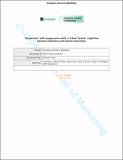Lin, Wei-Yu; Camp, Nicola J.; Ghoussaini, Maya; Beesley, Jonathan; Michailidou, Kyriaki; Hopper, John L.; Apicella, Carmel; Southey, Melissa C.; Stone, Jennifer; Schmidt, Marjanka K.; Broeks, Annegien; Van't Veer, Laura J.; Th Rutgers, Emiel J.; Muir, Kenneth; Lophatananon, Artitaya; Stewart-Brown, Sarah; Siriwanarangsan, Pornthep; Fasching, Peter A.; Haeberle, Lothar; Ekici, Arif B.; Beckmann, Matthias W.; Peto, Julian; Dos-Santos-Silva, Isabel; Fletcher, Olivia; Johnson, Nichola; Bolla, Manjeet K.; Wang, Qin; Dennis, Joe; Sawyer, Elinor J.; Cheng, Timothy; Tomlinson, Ian; Kerin, Michael J.; Miller, Nicola; Marmé, Frederik; Surowy, Harald M.; Burwinkel, Barbara; Guénel, Pascal; Truong, Thérèse; Menegaux, Florence; Mulot, Claire; Bojesen, Stig E.; Nordestgaard, Børge G.; Nielsen, Sune F.; Flyger, Henrik; Benitez, Javier; Zamora, M. Pilar; Arias Perez, Jose Ignacio; Menéndez, Primitiva; González-Neira, Anna; Pita, Guillermo; Alonso, M. Rosario; Álvarez, Nuria; Herrero, Daniel; Anton-Culver, Hoda; Brenner, Hermann; Dieffenbach, Aida Karina; Arndt, Volker; Stegmaier, Christa; Meindl, Alfons; Lichtner, Peter; Schmutzler, Rita K.; Müller-Myhsok, Bertram; Brauch, Hiltrud; Brüning, Thomas; Ko, Yon-Dschun; Tessier, Daniel C.; Vincent, Daniel; Bacot, Francois; Nevanlinna, Heli; Aittomäki, Kristiina; Blomqvist, Carl; Khan, Sofia; Matsuo, Keitaro; Ito, Hidemi; Iwata, Hiroji; Horio, Akiyo; Bogdanova, Natalia V.; Antonenkova, Natalia N.; Dörk, Thilo; Lindblom, Annika; Margolin, Sara; Mannermaa, Arto; Kataja, Vesa; Kosma, Veli-Matti; Hartikainen, Jaana M.; Wu, Anna H.; Tseng, Chiu-Chen; Van Den Berg, David; Stram, Daniel O.; Neven, Patrick; Wauters, Els; Wildiers, Hans; Lambrechts, Diether; Chang-Claude, Jenny; Rudolph, Anja; Seibold, Petra; Flesch-Janys, Dieter; Radice, Paolo; Peterlongo, Paolo; Manoukian, Siranoush; Bonanni, Bernardo; Couch, Fergus J.; Wang, Xianshu; Vachon, Celine; Purrington, Kristen; Giles, Graham G.; Milne, Roger L.; Mclean, Catriona; Haiman, Christopher A.; Henderson, Brian E.; Schumacher, Fredrick; Le Marchand, Loic; Simard, Jacques; Goldberg, Mark S.; Labrèche, France; Dumont, Martine; Teo, Soo Hwang; Yip, Cheng Har; Hassan, Norhashimah; Vithana, Eranga Nishanthie; Kristensen, Vessela; Zheng, Wei; Deming-Halverson, Sandra; Shrubsole, Martha J.; Long, Jirong; Winqvist, Robert; Pylkäs, Katri; Jukkola-Vuorinen, Arja; Kauppila, Saila; Andrulis, Irene L.; Knight, Julia A.; Glendon, Gord; Tchatchou, Sandrine; Devilee, Peter; Tollenaar, Robert A.E.M.; Seynaeve, Caroline; Van Asperen, Christi J.; García-Closas, Montserrat; Figueroa, Jonine; Lissowska, Jolanta; Brinton, Louise; Czene, Kamila; Darabi, Hatef; Eriksson, Mikael; Brand, Judith S.; Hooning, Maartje J.; Hollestelle, Antoinette; Van Den Ouweland, Ans M.W.; Jager, Agnes; Li, Jingmei; Liu, Jianjun; Humphreys, Keith; Shu, Xiao-Ou; Lu, Wei; Gao, Yu-Tang; Cai, Hui; Cross, Simon S.; Reed, Malcolm W. R.; Blot, William; Signorello, Lisa B.; Cai, Qiuyin; Pharoah, Paul D.P.; Perkins, Barbara; Shah, Mitul; Blows, Fiona M.; Kang, Daehee; Yoo, Keun-Young; Noh, Dong-Young; Hartman, Mikael; Miao, Hui; Chia, Kee Seng; Putti, Thomas Choudary; Hamann, Ute; Luccarini, Craig; Baynes, Caroline; Ahmed, Shahana; Maranian, Mel; Healey, Catherine S.; Jakubowska, Anna; Lubinski, Jan; Jaworska-Bieniek, Katarzyna; Durda, Katarzyna; Sangrajrang, Suleeporn; Gaborieau, Valerie; Brennan, Paul; Mckay, James; Slager, Susan; Toland, Amanda E.; Yannoukakos, Drakoulis; Shen, Chen-Yang; Hsiung, Chia-Ni; Wu, Pei-Ei; Ding, Shian-ling; Ashworth, Alan; Jones, Michael; Orr, Nick; Swerdlow, Anthony J; Tsimiklis, Helen; Makalic, Enes; Schmidt, Daniel F.; Bui, Quang M.; Chanock, Stephen J.; Hunter, David J.; Hein, Rebecca; Dahmen, Norbert; Beckmann, Lars; Aaltonen, Kirsimari; Muranen, Taru A.; Heikkinen, Tuomas; Irwanto, Astrid; Rahman, Nazneen; Turnbull, Clare A.; Waisfisz, Quinten; Meijers-Heijboer, Hanne E. J.; Adank, Muriel A.; Van Der Luijt, Rob B.; Hall, Per; Chenevix-Trench, Georgia; Dunning, Alison; Easton, Douglas F.; Cox, Angela (Oxford University Press (OUP), 2014-08-28)
Previous studies have suggested that polymorphisms in CASP8 on chromosome 2 are associated with breast cancer risk. To clarify the role of CASP8 in breast cancer susceptibility, we carried out dense genotyping of this ...


